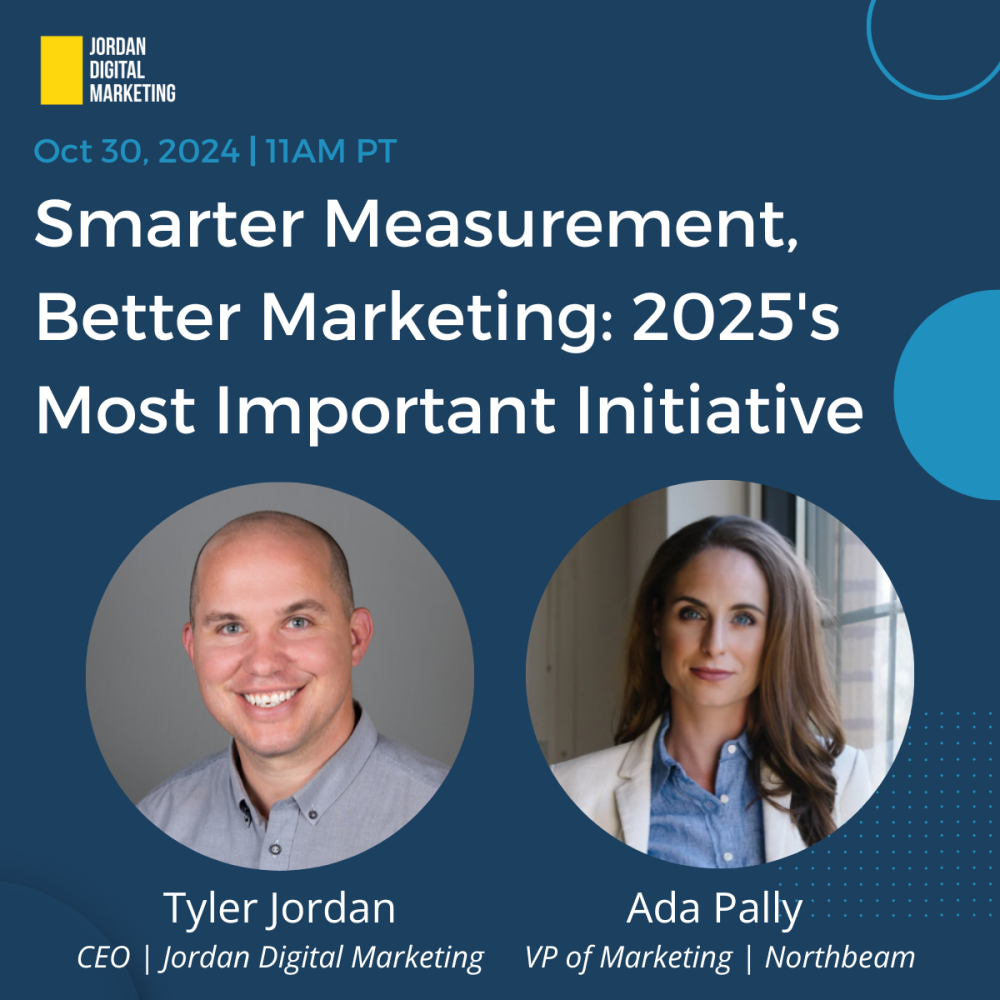As we look toward 2025, one of the most essential preparations marketers can make is establishing a strong foundation for better measurement. With data privacy changes, platform biases, and evolving attribution models, the landscape of digital marketing is shifting, and brands that prioritize robust, data-driven strategies will have a competitive edge.
Recently, JDM CEO Tyler Jordan and Northbeam VP of Marketing Ada Pally joined forces in a webinar titled "2025 Planning: Better Measurement, Better Outcomes" to share their insights on these challenges and provide actionable strategies for future-proofing marketing measurement. Here are 9 key takeaways from the session (and a link to the full webinar below):
1. Common Measurement Mistakes
Tyler emphasized that many marketers are either "confidently misinformed" or uncertain about their data. For B2B, he pointed out the pitfalls of focusing on early-funnel metrics like MQLs, which aren’t directly tied to revenue events. Instead, Tyler advises focusing on SQLs and pipeline stages that reflect true revenue outcomes.
2. Platform Bias and Data Silos
Ada highlighted how platforms like Google and Meta are seeing less of the customer journey, increasing the bias in platform data. Relying too heavily on this can skew marketing decisions. Blending insights across platforms and using tools to create a unified view are essential to counteract this bias.
3. The Importance of Unsiloing Data
Tyler stressed that un-siloing data and establishing a “source of truth” for all networks is a significant improvement that can streamline long lead cycles, especially in B2B. This helps track top- and bottom-funnel events as part of a holistic sales journey rather than isolated metrics.
4. Attribution as a Journey, Not a Destination
Both Tyler and Ada emphasized the importance of treating attribution as a journey. Tyler recommends picking an initial model that aligns with business goals, then gradually improving it. A consistent, directionally accurate model is preferable to frequent, inconsistent changes, which can muddy performance insights.
5. Transition Away from Last-Click Attribution
Ada discussed why last-click attribution is outdated for most advertisers. It may offer immediate gratification, but it fails to capture the full customer journey. Instead, companies should evaluate models that reflect their specific business goals and customer touchpoints.
6. The Renaissance of Creative in Marketing
Ada referred to the renewed focus on creative testing and its role in the full-funnel approach. Advanced tools now allow a deeper understanding of which creatives work best at various stages—brand awareness, engagement, or conversion.
7. Preparing for the GA4 and Cookie Transition
Tyler underscored the urgency of transitioning to first-party data. As privacy measures intensify, transitioning early will provide a buffer period to understand data differences and adapt effectively. Waiting until the last minute could result in data loss and limited insights.
8. Embracing the "Signal" Over "Audience" Focus
As automation evolves, Tyler highlighted the shift from audience targeting to signal-focused strategies. Feeding the right signals back into ad platforms allows advertisers to optimize around meaningful events, keeping top-funnel activities relevant and engaging.
9. Martech’s Role in Simplifying Complex Data Needs
With traditional media buying tactics dwindling, both Tyler and Ada encouraged leveraging Martech solutions like Northbeam to orchestrate data across platforms, creating a cohesive picture that’s increasingly necessary in a fragmented landscape.
Ready for Better Measurement in 2025?
If you’re serious about setting up for success in 2025, don’t miss the opportunity to dive deeper. Watch the full webinar on-demand to gain comprehensive insights and actionable guidance to optimize your marketing measurement for the future.
